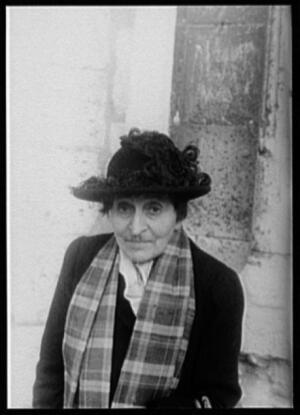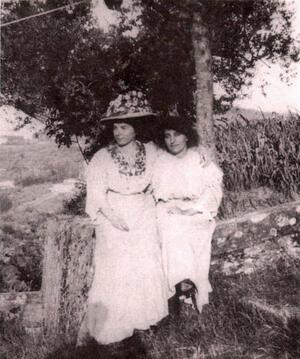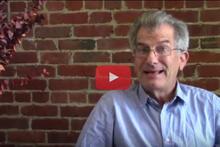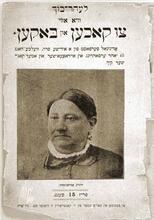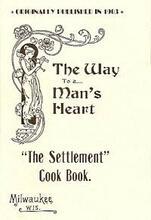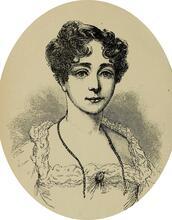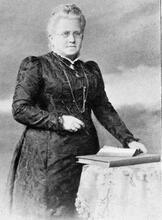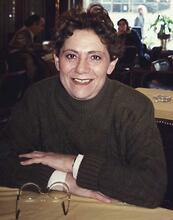Alice Babette Toklas
Born in San Francisco, Alice B. Toklas is an indelible figure in modern cultural history. Soon after moving to Paris in 1907, she met author Gertrude Stein, with whom she spent the rest of her life. Described as Stein’s housekeeper, cook, typist, secretary, and friend, she kept the household running smoothly, typed all of Stein’s writings, helped to publicize and publish her works, and served as gatekeeper to weed out friend from foe. After Stein’s death in 1946, she became a well-known cookbook writer and memoirist and was sought after for her many stories about her famous friends and acquaintances, and enemies.
The California Years
The trajectory of Toklas’s life could not have been predicted from her early years. She was born in San Francisco on April 30, 1877, the first child and only daughter of Ferdinand and Emma (Levinsky) Toklas, and she grew up in San Francisco and Seattle, where her father was a merchant. On both sides of the family, Toklas was descended from Polish immigrants. Her father immigrated to America in 1865. Her maternal grandfather, Louis Levinsky, and his brothers joined the waves of forty-niners who came to California in search of gold. Instead of finding gold, however, the Levinskys discovered that they could prosper as merchants, and their dry-goods store in Jackson, California, soon yielded enough capital to finance a more substantial store in San Francisco.
The Levinskys were observant Jews. In Jackson, John Levinsky, one of Louis’s brothers, became president of the first synagogue established in the town. Louis and two other brothers served on the board of trustees. There is no evidence, however, that Toklas was taught the tenets of Judaism, nor did she practice the religion later in her life. In fact, after Stein’s death, Toklas converted to Catholicism in the hope, she explained, of meeting Stein in heaven.
Toklas was educated in private schools and attended the University of Seattle. She studied piano and apparently showed sufficient talent to consider becoming a concert pianist. Although she never pursued music, she was attracted to the arts and had friends in the San Francisco arts community, including Annette Rosenshine, who later became a noted sculptor, and Harriet Lane Levy, who became a journalist and memoirist. Levy’s autobiography 920 O’Farrell Street (1947) recounts her youth in San Francisco, an atmosphere that Toklas shared.
Toklas’s favorite author was Henry James, whose fictional worlds she longed to experience for herself by traveling to Europe. Her chance came when, after the devastating San Francisco earthquake of 1906, Michael and Sarah Stein, the brother and sister-in-law of Gertrude, returned to the city from Paris to assess damage done to their property. Toklas listened eagerly as the Steins described their life abroad, convincing her to journey to France. She had little to keep her in California: Her mother had died on March 10, 1897, just weeks before Toklas’s twentieth birthday, and since then she had been serving as housekeeper to her father, younger brother, and assorted male relatives. Moreover, realizing that she felt sexually attracted to several women friends, she was convinced that she would not marry and fulfill the roles of wife and mother that her family expected of her. She longed for escape.
A Bell Chimed in Paris
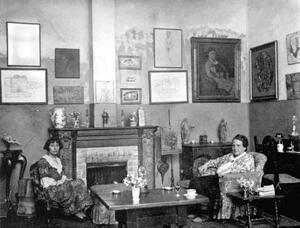
Institution: Yale Collection of American Literature, Beinecke Rare Book and Manuscript Library
Toklas arrived in Paris in September 1907 and immediately met Gertrude Stein. At the time, Stein, thirty-three, was not the literary lion she would become but rather a lonely woman unsure of her talents as a writer, troubled by her sexuality, living in the shadow of her loquacious and domineering brother Leo. Stein found a sympathetic spirit in Alice Toklas, and the two women quickly became friends and then lovers. Toklas, for her part, claimed that a bell rang for her each time she encountered a genius, and she heard distinct chiming when she met Gertrude Stein. Stein, who had been residing unhappily with Leo, suggested that sharing her life with Toklas would be more satisfactory. She proved to be right.
Toklas has been described as Stein’s housekeeper, cook, typist, secretary, and friend. She was all of these. She kept the household running smoothly, typed all of Stein’s writings, helped to publicize and publish her works, and served as gatekeeper to weed out friend from foe. Sometimes her assessments did not coincide with Stein’s—but Toklas prevailed. She doted upon F. Scott Fitzgerald, who was welcome at the salon. She feared that Hemingway was trying to seduce Stein, and he was barred. Many who visited the salon remember Stein talking with the more famous male artists and writers, while Toklas took on the task of talking with their wives.
Although she dominated their personal relationship, Toklas was reticent about competing with Stein as a writer. Stein, after all, was the acknowledged genius. But Toklas gained considerable notoriety in 1934, when Stein published The Autobiography of Alice B. Toklas. Despite its title, the book centers around Stein: her adventures, opinions, and view of life. Friends of the couple, however, testify that in the dry humor and droll anecdotes we can hear Toklas’s voice. After the book was published in America, Toklas’s name became a household word.
Stein wrote about Toklas in her more hermetic works as well. Many poems, prose pieces, and plays offer glimpses of the couple’s daily life together. Some of Stein’s works read as love letters to Toklas; some reflect Stein’s unhappiness and discomfort caused by her concern about Toklas’s possible disloyalty or even infidelity. Although these works have been mined for biographical references by some scholars, the task has by no means been completed.
Later Years
Toklas wrote her own works only after Stein’s death. The Alice B. Toklas Cookbook (1954) contained recipes from many of the couple’s famous friends; artist Brion Gysin contributed the famous recipe for hashish fudge, although Toklas claimed that she never tested the recipes and was not aware of the surprising ingredient. Critics pounced on the opportunity to explain some of Stein’s strange writing. The cookbook offers many anecdotes centering around Stein’s culinary likes and dislikes, her eccentricities, and her adventures. Similarly, Toklas’s memoir What Is Remembered largely perpetuates Stein’s public image. A second cookbook, Aromas and Flavors of Past and Present, although it bears Toklas’s name as author, was largely the work of the book’s editor, Poppy Cannon.
In the last decades of her life, Toklas was sought after for her many stories about her famous friends and acquaintances—and enemies—including F. Scott Fitzgerald, Ernest Hemingway, Pablo Picasso, Henri Matisse, Thornton Wilder, and scores of other writers, artists, and musicians.
Toklas suffered from arthritis and cataracts during her last years. Buoyed only by her memories, she hardly could see the paintings that she and Stein had collected, and the landlord of the Paris apartment in which she lived alone would not allow her to drive a nail into the wall to hang them.
Alice Babette Toklas died on March 7, 1967, and is buried beside Stein in the Père-Lachaise cemetery in Paris.
Selected Works by Alice Babette Toklas
The Alice B. Toklas Cookbook (1954); Aromas and Flavors of Past and Present (1958); What Is Remembered (1963).
Burns, Edward, ed. Staying On Alone: Letters of Alice B. Toklas. London: 1973.
DAB 8: 655.
“Alice Toklas, 89, Is Dead In Paris.” NYTimes, March 8, 1967, 45:1.
Malcolm, Janet. Two Lives: Gertrude and Alice. New Haven, CT: 2007.
NAW modern.
Simon, Linda. “Alice B. Toklas,” Dictionary of Literary Biography (1980): 391–394.
Simon, Linda. The Biography of Alice B. Toklas. Lincoln, NE: 1977, Reprint 1991.
Simon, Linda. Gertrude Stein Remembered. Lincoln, NE: 1994.
Stein, Gertrude. The Autobiography of Alice B. Toklas. New York: 1933.
Stein, Gertrude. The Autobiography of Alice B. Toklas. Illustrated by Maira Kalman. New York: Penguin Press, 2020.
Stein, Gertrude. Everybody’s Autobiography. New York: 1937.
Toklas, Alice B. Papers. Bancroft Library, University of California at Berkeley, and Beinecke Library, Yale University, New Haven, Conn.

